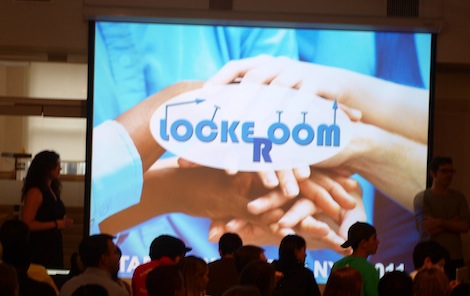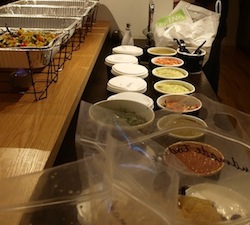The last time I attended a NYC Startup Weekend at General Assembly I found myself wedged against the wall near the kitchen serving area with just enough elbow room to jot down a few notes.
While it was less crowded on Sunday evening during the final presentations for this August SW—maybe something to do with the monsoon rains and flooded subways—the energy levels were still very high and it was great fun watching these raw but spirited pitches.
After a careful review of my notes, I’ve come up with my list of favorites: LockeRoom, ReadBak, OinkerBox, Walkey.me and Sharewith911.
This time around I was in partial sync with the judges’ choices: Sharewith911 garnered a first, and ReadBak took second place.
But in the important what-does-anybody-know category, which the judges did not consider, I have several hand-written stars next to Postcards from Anywhere, the service that lets you send postmarked cards from faraway places with your signature.
One could not help but notice several food-oriented pitches: Foodalicious, I’ll Eat That, and Froo.sh were all in the business of finding a specific appetizer or entree in the restaurant-verse.
I’m sure I express the sentiment of millions of others in saying that I’m tired of hearing pitches involving a place-to-eat search model. It doesn’t mean that any enterprise has nailed this yet, though FoodSpotting has come pretty close. I am still waiting for a startup called something like “What’s for Dinner?”, which would involve ordinary cooks sharing their meals and kitchens with strangers for a fee—a combination of FoodSpotting and airbnb.

In the non-food category, there was LockeRoom, a service that let jocks and jockettes reserve sports venues—YMCA volley ball courts, public baseball fields, miniature golf, etc.—without letting the initiator of the outing get stuck with the bill when not everyone shows up.
Instead they would use LockeRoom to track in real-time team members’ payments, so that when the check is deposited there’s money in the bank.
As with all the business ideas I see at these hackathons and insta-startup events, there are lots of competitors. LockeRoom is no exception. Their leadership, though, assured us that no one has taken on the smaller sports venue market. I believe them.
OinkerBox is an escrow service for sublettors and sublettees. This proposition will resonate strongly in the contentious New York City rental market, which apparently was the inspirational source.
More than a temporary bank for security deposits, OinkerBox will also provide qualified tenants for the sublettees. Overall their approach seemed sane and rational, which is something I usually don’t associate with landlords and apartments.
Voice over artists along with Very Busy People will be excited by ReadBak’s service.This startup crowdsources a crew to record online news content that’s stored on the ReadBak platform. The audio quality of spoken articles is then checked by their crew of remote ooompah loompahs before it’s pushed out to subscribers’ mobile devices.
From what I could understand, they’re using Twilio’s telephony service to digitize the audio (and that would explain the Twillio T-shirts I saw being worn by a few attendees).

Does Foodalicious know about this?
It’s a clever idea, which I’ve not seen presented before. The ReadBak team has business savvy: we learned during the judges questioning that ReadBak is courting The New York Times, which has expressed “pretty serious intent” in a partnership arrangement.
Thought you were the only one who knew how to get around Manhattan in the rain by dodging into buildings and navigating secret underground malls and passageways? You are not alone, and Walkey.me intends to take all that knowledge, put it online, and essentially force street umbrella sellers out of business.
ShareWith911, which was the final and winning presentation, certainly captured the attention and good will of the audience and the judges. Their plan is to consolidate a stream of crowdsourced tweets and pictures, publishing critical information to mobile gadgets for first responders.
But … the FCC has been working on this very complex problem in emergency management for eons and even has proposed a standard, called Common Alerting Protocol or CAP, which will bring our analog alerts into the digital age. If ShareWith911 supports CAP, then I see know reason why a third-party can’t enter this market.
On the other hand, knowing the glacial pace of the FCC, maybe SW9 should come out with their own platform and standard.
Related articles
- NYC Startup Weekend
- Walky.me
- OinkerBox
- ReadBak
- ShareWith911
- Froo.sh
- Back at the FCC: Community Information Needs and Hurricanes (technoverseblog.com)
- NYC Startup Weekend Finale: 2 Hours, 20+ Presentations (technoverseblog.com)


